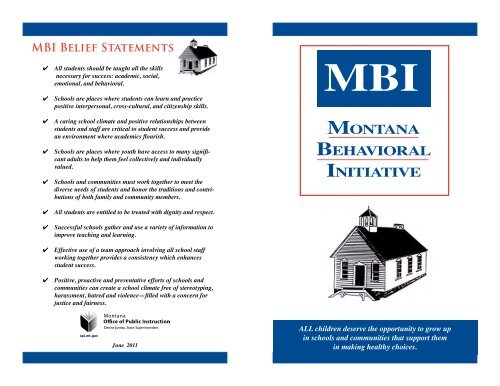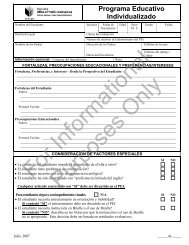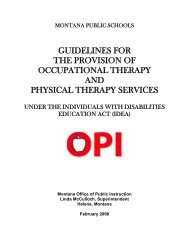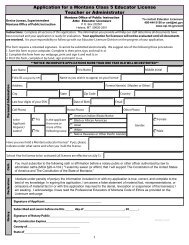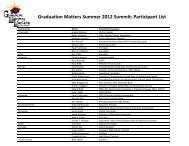MBI Brochure - Montana Office of Public Instruction
MBI Brochure - Montana Office of Public Instruction
MBI Brochure - Montana Office of Public Instruction
Create successful ePaper yourself
Turn your PDF publications into a flip-book with our unique Google optimized e-Paper software.
<strong>MBI</strong> Belief Statements<br />
✔ All students should be taught all the skills<br />
necessary for success: academic, social,<br />
emotional, and behavioral.<br />
<strong>MBI</strong><br />
✔ Schools are places where students can learn and practice<br />
positive interpersonal, cross-cultural, and citizenship skills.<br />
✔ A caring school climate and positive relationships between<br />
students and staff are critical to student success and provide<br />
an environment where academics flourish.<br />
✔ Schools are places where youth have access to many significant<br />
adults to help them feel collectively and individually<br />
valued.<br />
✔ Schools and communities must work together to meet the<br />
diverse needs <strong>of</strong> students and honor the traditions and contributions<br />
<strong>of</strong> both family and community members.<br />
<strong>Montana</strong><br />
Behavioral<br />
Initiative<br />
✔ All students are entitled to be treated with dignity and respect.<br />
✔ Successful schools gather and use a variety <strong>of</strong> information to<br />
improve teaching and learning.<br />
✔ Effective use <strong>of</strong> a team approach involving all school staff<br />
working together provides a consistency which enhances<br />
student success.<br />
✔ Positive, proactive and preventative efforts <strong>of</strong> schools and<br />
communities can create a school climate free <strong>of</strong> stereotyping,<br />
harassment, hatred and violence—filled with a concern for<br />
justice and fairness.<br />
June 2011<br />
ALL children deserve the opportunity to grow up<br />
in schools and communities that support them<br />
in making healthy choices.
<strong>MBI</strong><br />
Mission <strong>of</strong> the <strong>MBI</strong> . . .<br />
The <strong>Montana</strong> Behavioral Initiative (<strong>MBI</strong>)<br />
assists educators, parents, and other community<br />
members in developing the attitudes, skills, and systems<br />
necessary to ensure that each student, regardless <strong>of</strong> ability or<br />
disability, leaves public education and enters the community<br />
with social and academic competence.<br />
<strong>MBI</strong> State Coordinator<br />
Susan Bailey-Anderson, Specialist<br />
<strong>Office</strong> <strong>of</strong> <strong>Public</strong> <strong>Instruction</strong><br />
Denise Juneau, Superintendent<br />
PO Box 202501<br />
Helena, <strong>Montana</strong> 59620-2501<br />
(406) 444-2046<br />
Fax (406) 444-3924<br />
sbanderson@mt.gov<br />
www.opi.mt.gov<br />
<strong>MBI</strong><br />
<strong>Montana</strong> Behavioral Initiative<br />
Advisory Council:<br />
Chair:<br />
Jael Prezeau, Libby <strong>Public</strong> Schools<br />
293-8811 or 293-8813 x 34 E-mail: prezeauj@libby.k12.mt.us<br />
Stakeholders:<br />
Students<br />
Parents<br />
Board <strong>of</strong> <strong>Public</strong> Education<br />
School Administrators <strong>of</strong> <strong>Montana</strong><br />
<strong>Montana</strong> Association <strong>of</strong> School Superintendents<br />
<strong>Montana</strong> Association <strong>of</strong> Elementary & Middle School Principals<br />
Council <strong>of</strong> Administrators in Special Education<br />
<strong>Montana</strong> <strong>Office</strong> <strong>of</strong> <strong>Public</strong> <strong>Instruction</strong><br />
Governor's <strong>Office</strong><br />
MEA-MFT<br />
<strong>Montana</strong> School Boards Association<br />
<strong>Montana</strong> Higher Education<br />
<strong>Montana</strong> Council for Exceptional Children<br />
<strong>Montana</strong> Council for Children with Behavior Disorders<br />
<strong>Montana</strong> Association <strong>of</strong> School Psychologists<br />
<strong>Montana</strong> Board <strong>of</strong> Crime Control<br />
<strong>Montana</strong> Youth Justice Council<br />
<strong>Montana</strong> Juvenile Probation <strong>Office</strong>rs Association<br />
Department <strong>of</strong> <strong>Public</strong> Health & Human Services<br />
Attorney General's <strong>Office</strong><br />
Jobs for <strong>Montana</strong> Graduates, Department <strong>of</strong> Labor/OPI<br />
<strong>Montana</strong> School Social Workers<br />
Department <strong>of</strong> Emergency Services<br />
School Nutrition Programs, OPI<br />
<strong>Montana</strong> High School Association<br />
<strong>Montana</strong> Prevention Resource Center and<br />
the Interagency Coordinating Council<br />
Safer Schools and Communities Project,<br />
Division <strong>of</strong> Educational Research and Service,<br />
University <strong>of</strong> <strong>Montana</strong><br />
School <strong>of</strong> Psychology<br />
University <strong>of</strong> <strong>Montana</strong>
<strong>MBI</strong><br />
<strong>Montana</strong> Behavioral<br />
Initiative Resources<br />
State Coordinator:<br />
Susan Bailey-Anderson, <strong>Office</strong> <strong>of</strong> <strong>Public</strong> <strong>Instruction</strong><br />
444-2046 (fax) 444-3924 Email: sbanderson@mt.gov<br />
<strong>MBI</strong> Consultants:<br />
Dale Anderson-248-3372 Pat Grassl – 324-2085<br />
Email: daleanderson_1944@msn.com Email: pgrassl@helena.k12.mt.us<br />
Dawn Blair – 873-4421(w) 873-5309(h) Susanna Graves- – 586-6089<br />
Email: dbhsdb@cutbankschools.net Email: gravessusanna@gmail.<br />
Doug Cochran-Roberts – 240-3510 Leslie Jorgenson – 580-7502<br />
Email: karidoug2@me.com<br />
Email: leslie.jorgenson@gmail.com<br />
Lynn Darfler – 422-9966(h) 459-6644 (cell) Greg Machek, PhD<br />
Email: ldarfler@bresnan.net<br />
Email: greg.machek@mso.umt.edu<br />
Denise DesJarlais – 855-2126 Brittany McKenzie – 363-7412 x 201<br />
Email: toteach04@msn.com<br />
Email: brittanym@ravalliheadstart.org<br />
Susan Dotter – 324-1084 Denielle Miller – 587-4970<br />
Email: sdotter@helena.k12.mt.us<br />
Email: dmiller@bridgeband.com<br />
or sadotter@bresnan.net<br />
John Downs – 599-4595<br />
Karen Molzahn-600-6931<br />
Email: downsj194@msn.com<br />
Email: kmolzahn@hotmail.com<br />
JJ Drummond – 899-3269 Marcy Otten – 243-2262<br />
Email: JDrummond@beltschool.com Email: marcy.otten@mso.umt.edu<br />
Amy Foster-Wolferman – 243-5417 Julie Pribyl – 736-5582<br />
Email: amy.fosterwolferman@mso.umt.edu Email: pribylju@3riversdbs.net<br />
Joe Furshong – 431-9594 Robert Rase – 490-0662<br />
Email: jfurshong@mac.com<br />
Email: rjrase@yahoo.com<br />
Keith Hoyer – 788-5688 Greg Thurlow – 570-8645<br />
Email: KHoyer@beltschool.com<br />
Email: gthurlow@mac.com<br />
Michelle Harrell – 873-2122 Glenda Truesdell – 980-1813<br />
Email: michelleharrell@yahoo.com Email: gtruesdell@helena.k12.mt.us<br />
Chris Hughes – 777-2494 x 16<br />
Email: hughes@bvec-mt.org<br />
<strong>MBI</strong> Web Site Address: www.opi.mt.gov/Programs/schools/<strong>MBI</strong>/index/html<br />
What is the <strong>Montana</strong><br />
Behavioral Initiative?<br />
<strong>MBI</strong><br />
The term initiative refers to proactive efforts by community and school<br />
leaders to identify and prioritize concerns, teach acceptable alternatives<br />
to inappropriate behaviors and create a culture <strong>of</strong> respect in the academic<br />
setting. With this in mind, the <strong>Montana</strong> Behavioral Initiative is a contentbased<br />
staff development philosophy and process designed to meet students'<br />
diverse and complex social, emotional, behavioral, and academic needs.<br />
More specifically, <strong>MBI</strong> endorses the belief statements located on the back<br />
<strong>of</strong> the brochure.<br />
Key Goals <strong>of</strong> the <strong>MBI</strong> . . .<br />
Training<br />
• To increase the awareness and understanding <strong>of</strong> effective schools<br />
practices.<br />
Team Process<br />
• To increase and improve the use <strong>of</strong> team processes in educational<br />
decision-making and in addressing issues concerning our youth.<br />
Proactive Support Systems<br />
• To support the implementation <strong>of</strong> best practices procedures in <strong>Montana</strong>'s<br />
schools, foster beliefs which hold that all children are valued,<br />
and that positive and proactive approaches to problems produce the<br />
most satisfying results.<br />
Evaluation Process<br />
• To increase awareness regarding the value and use <strong>of</strong> data-based<br />
decision-making in education.<br />
Community Process<br />
• To foster the belief that the education <strong>of</strong> today's youth is a community<br />
responsibility.<br />
8 1
<strong>MBI</strong><br />
Why a Behavioral<br />
Initiative<br />
in <strong>Montana</strong>?<br />
In <strong>Montana</strong>, school personnel, students, parents,<br />
and public <strong>of</strong>ficials are calling for solutions to increasing incidents <strong>of</strong><br />
insubordination, alienation, aggressive behavior, truancy, drug use, drop<br />
out rates, and vandalism. As partners in education, we have a shared<br />
responsibility to address these concerns by developing a positive school<br />
culture, which includes the characteristics <strong>of</strong> personal and social responsibility<br />
and productive community participation.<br />
History <strong>of</strong> the<br />
<strong>Montana</strong> Behavioral<br />
Initiative . . .<br />
In the spring <strong>of</strong> 1995, five community school partnerships were selected<br />
to become model sites. Each site selected a team <strong>of</strong> educators, parents,<br />
and community members to assess site-based school and community needs<br />
and to develop goals to address those needs. In turn, the team developed<br />
plans and strategies to meet these goals.<br />
The <strong>MBI</strong> has grown from the original five model sites to over 200<br />
participating schools. The <strong>MBI</strong> sites utilize facilitators trained by <strong>MBI</strong><br />
to provide guidance and direction to site-based teams. As a result, many<br />
positive, proactive and preventative strategies have been implemented.<br />
BEST PRACTICE:<br />
Designing School-Wide<br />
Systems for<br />
Student Success<br />
Academic Systems<br />
Individual Intervention<br />
•Assessment-based<br />
•High intensity<br />
Targeted Group<br />
Interventions<br />
•Some students (at-risk)<br />
•High efficiency<br />
•Rapid response<br />
15%<br />
5%<br />
Universal Intervention<br />
•All students<br />
•Preventive,<br />
proactive<br />
80%<br />
5%<br />
15%<br />
<strong>MBI</strong><br />
Behavioral Systems<br />
Individual Intervention<br />
•Assessment-based<br />
•High intensity<br />
Targeted Group<br />
Interventions<br />
•Some students (at-risk)<br />
•High efficiency<br />
•Rapid response<br />
Universal Intervention<br />
•All students<br />
•Preventive,<br />
80% proactive<br />
Two important features characterize the <strong>MBI</strong> process:<br />
1. local teams are free to choose any validated strategies from an<br />
array <strong>of</strong> proven practices, and<br />
2. some form <strong>of</strong> evaluation data corroborates team perceptions<br />
<strong>of</strong> need and outcome.<br />
2 7
<strong>MBI</strong><br />
State Coordinator<br />
➤ links the <strong>MBI</strong> components together<br />
➤ coordinates pr<strong>of</strong>essional development training<br />
➤ networks with other agencies<br />
➤ develops materials<br />
➤ assists with Summer Institute planning<br />
Information Sharing<br />
➤ workshops and conference presentations<br />
➤ listserv participation<br />
➤ web site information<br />
➤ brochures and other resources<br />
➤ site visitations and presentations<br />
Interagency/Community Cooperation<br />
➤ Community and statewide agencies support <strong>MBI</strong> by:<br />
• working with schools to strengthen community and state<br />
resources<br />
supporting policy and procedures to facilitate effective and efficient<br />
services for our youth<br />
• coordinating community-based services with schools<br />
• encouraging change that enables schools and communities to<br />
provide quality services for youth<br />
➤ Youth Day<br />
Evaluation<br />
➤ Evaluation:<br />
• contracted evaluator analyzes statewide implications <strong>of</strong> <strong>MBI</strong><br />
• ongoing decision-making and management activities<br />
• data-driven decision-making management<br />
<strong>MBI</strong><br />
Effective Schools Research . . .<br />
Effective schools research indicates that there are attitudes, skills and<br />
systems that, if implemented, will lead to student success and a positive<br />
school culture. They are:<br />
Attitudes<br />
Effective programs and schools:<br />
• have unconditional positive regard for students<br />
• maintain a positive and proactive focus<br />
• assert beliefs <strong>of</strong> responsibility and self-efficacy<br />
• affirm high, success-oriented student expectations<br />
Skills<br />
Effective programs and schools:<br />
• match instruction and services to individual student needs<br />
• employ a proactive curricula<br />
• use validated instructional strategies<br />
• provide systematic data-based interventions<br />
Systems<br />
Effective systems:<br />
• are supported by strong leaders<br />
• provide an array <strong>of</strong> services<br />
• engage parents<br />
• collaborate with community agency and service providers<br />
• employ schoolwide approaches involving both general and<br />
special educators<br />
• engage in systematic staff development for school improvement<br />
• conduct ongoing program evaluation<br />
• have a clearly defined vision for improvement<br />
Effective Schools Research can be accessed at www.nwrel.org<br />
6 3
<strong>MBI</strong><br />
<strong>MBI</strong><br />
Components<br />
Components <strong>of</strong> <strong>MBI</strong> . . .<br />
Summer Institute<br />
<strong>MBI</strong><br />
➤ nationally recognized pr<strong>of</strong>essional development institute<br />
➤ more than 5,000 individuals and site teams educated in best practices<br />
➤ networking opportunities for community partners<br />
Attitudes<br />
Positive School and<br />
Community Climates for Student<br />
Social, Emotional, and Behavioral Growth<br />
Facilitators<br />
Inter-Agency/<br />
Consultants<br />
Community<br />
State Cooperation<br />
Coordinator<br />
Information<br />
Evaluation<br />
Sharing<br />
Council<br />
Systems<br />
Summer Skills<br />
Institute<br />
Facilitators<br />
➤ participate in pr<strong>of</strong>essional development training, enhancing facilitator<br />
and team leadership skills<br />
➤ help sites develop an understanding <strong>of</strong> the <strong>MBI</strong> process<br />
➤ organize an <strong>MBI</strong> team to identify and address site-based concerns<br />
➤ guide sites through the <strong>MBI</strong> process<br />
➤ extend knowledge <strong>of</strong> "best practices" and validated educational strategies<br />
➤ assist in the development <strong>of</strong> community involvement<br />
➤ network with educators and community members statewide<br />
Council<br />
➤ oversees the development <strong>of</strong> <strong>MBI</strong> practices and principles<br />
➤ links with state coordinator and the various components <strong>of</strong> <strong>MBI</strong><br />
➤ meets regularly for sharing, communicating, and strategic planning<br />
➤ coordinates efforts to impact statewide policies, guidelines or structures<br />
which will promote the mission and goals <strong>of</strong> <strong>MBI</strong><br />
Consultants<br />
➤ develop and provide technical assistance, training, and support services<br />
➤ support site teams in their understanding and implementation <strong>of</strong> <strong>MBI</strong><br />
goals<br />
➤ serve on the <strong>MBI</strong> Council<br />
➤ participate in focused training, joint problem-solving and coordinated<br />
efforts to promote the mission and goals <strong>of</strong> <strong>MBI</strong><br />
4 5


